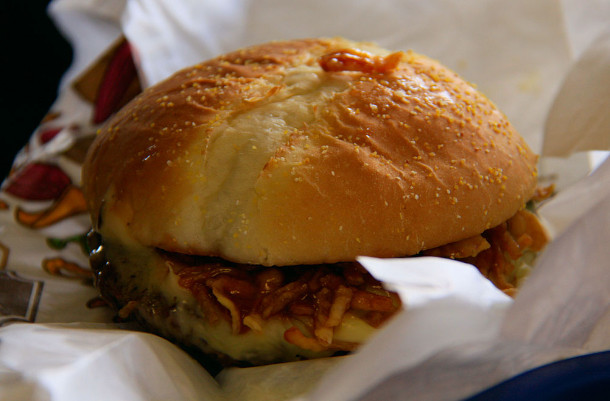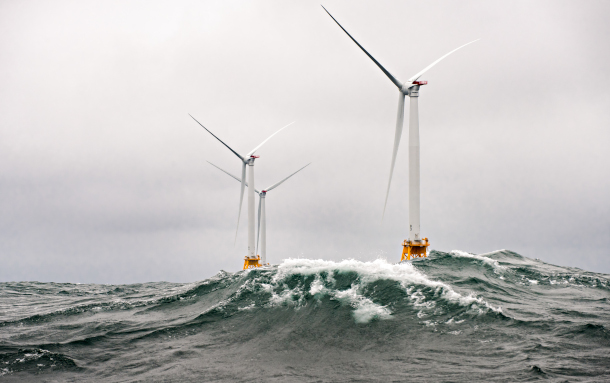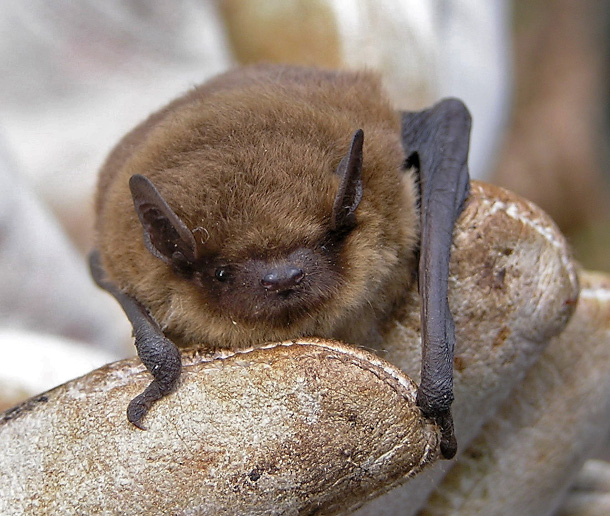Beyond the Headlines
Air Date: Week of March 8, 2024

Fast food chains like McDonalds are now in compliance with the Food and Drug Administration’s plan of phasing out PFAS from food packaging. PFAS has health issues like cholesterol, weakened liver function and cancer. (Photo: Waferboard, Flickr, CC BY 2.0)
This week, Living on Earth Contributor Peter Dykstra and Host Paloma Beltran discuss the FDA’s announcement that PFAS used to grease-proof food packaging is no longer being used in the U.S. Also, the new offshore wind farm Vineyard Wind now has 5 of 62 planned turbines up and running and helping power the Massachusetts grid. And in history, they look back to when Monty Python met bat biology, with the 2008 documenting of pipistrelle bats living inside the castle of a foul-mouthed Frenchman played by John Cleese.
Transcript
BELTRAN: With me now on the line from Atlanta, Georgia is Living on Earth contributor Peter Dykstra. Hi there, Peter, what do you have for us this week?
DYKSTRA: Hi, Paloma. We've got news of a collaboration between a government regulatory agency and industry, something we don't hear about very often. But the Food and Drug Administration is collaborating with food manufacturers to eliminate PFAS, the so called forever chemicals from food packaging. Companies like McDonald's already stopped using any packaging with PFAS.
BELTRAN: And we've talked about PFAS chemicals in the past here on the show. Remind us, what are some of the health risks associated to them?
DYKSTRA: There are plenty. Some of the severe health issues could include raised cholesterol, problems with liver function and the immune system, and cancer risks as well. And the forever chemicals part of it is important because these are substances that once appearing in the environment tend to never go away.
BELTRAN: And you shared this recent announcement by the FDA that fast food companies in the US are now in compliance with phasing out PFAS from fast food wrapping. But PFAS is still in a lot of other sources, right?
DYKSTRA: Drinking water is another key source for how it can enter our food chain and our bodies. And there are cleaning products and other things that are a part of our everyday life. But getting it out of our food system is one way to reduce the risks that we're just now beginning to understand.
BELTRAN: PFAS in our fast food sounds really unappetizing, so this definitely seems like a small step in the right direction. Where should we go to next, Peter?
DYKSTRA: Well, there's some news from your neck of the woods in Massachusetts. There's an offshore wind farm that has started powering homes in Massachusetts. You might remember 10 or 12 years ago, the saga of Cape Wind, the first attempt to bring large scale wind power to New England. There was a struggle of over a decade. Eventually after a lot of outside money and fierce opposition, the funders of Cape Wind couldn't hold out any longer, the project died. But now very near the site of Cape Wind is a new company called Vineyard Wind. They plan 62 wind turbines, 5 of which are already running, enough to power 30,000 homes. And if and when all 62 of those turbines are up, that potential is going to increase more than tenfold to about 400,000 Massachusetts homes.

Vineyard Wind, the wind farm under construction off the coast of Massachusetts, has begun delivering energy to the power grid, around 68 megawatts of power, enough to power about 30,000 homes. (Photo: National Renewable Energy Lab, Flickr, CC BY-NC-ND 2.0)
BELTRAN: 400,000 homes, that's amazing. Maybe we'll get some of the energy to help run the LOE broadcast.
DYKSTRA: There you go.
BELTRAN: Now let's look back into history. What do you see Peter?
DYKSTRA: March 8, 2008. There's a meeting of mammalian biology with Monty Python. A castle in Doune, Scotland that was featured in the film Monty Python and the Holy Grail became a field lab for studying migratory bats. Specifically a small bat called the pipistrelle was discovered spending its winters in the castle, where a foul-mouthed French soldier played by John Cleese once taunted King Arthur and his court.
MONTY PYTHON FRENCHMAN: I'll blow my nose at you so-called Arthur King. You and all your silly English kiiiiiiingilits [SPIT].
BELTRAN: Cheap insults and a hit movie and the study of bats, sign me up Peter.

In 2008 more than 30 pipistrelle bats were found hibernating in Doune castle, the Scottish keep featured in the 1975 film "Monty Python and the Holy Grail." (Photo: Dave. Flickr, CC BY-NC-SA 2.0)
DYKSTRA: Oh yeah, and you're dealing with studying mammals, with pythons who of course are not mammals, in a meeting between movies, comedy and biology. Now, go away, or I shall taunt you a second time.
BELTRAN: All right, Peter, thank you for bringing these stories as always. Peter Dykstra is a Living on Earth contributor and we will talk to you again real soon.
DYKSTRA: All right Paloma, thanks a lot. Talk to you soon.
BELTRAN: And there's more on these stories on the Living on Earth website. That's loe.org.
Links
Environmental Health News | “US Fast-Food Packaging Says Goodbye to ‘Forever Chemicals’”
The Daily Climate | “Massachusetts’ Offshore Wind Farm Starts Powering Homes”
AP News | “Wind Farm Off the Massachusetts Coast Begins Delivering Steady Flow of Power”
Living on Earth wants to hear from you!
Living on Earth
62 Calef Highway, Suite 212
Lee, NH 03861
Telephone: 617-287-4121
E-mail: comments@loe.org
Newsletter [Click here]
Donate to Living on Earth!
Living on Earth is an independent media program and relies entirely on contributions from listeners and institutions supporting public service. Please donate now to preserve an independent environmental voice.
NewsletterLiving on Earth offers a weekly delivery of the show's rundown to your mailbox. Sign up for our newsletter today!
 Sailors For The Sea: Be the change you want to sea.
Sailors For The Sea: Be the change you want to sea.
 The Grantham Foundation for the Protection of the Environment: Committed to protecting and improving the health of the global environment.
The Grantham Foundation for the Protection of the Environment: Committed to protecting and improving the health of the global environment.
 Contribute to Living on Earth and receive, as our gift to you, an archival print of one of Mark Seth Lender's extraordinary wildlife photographs. Follow the link to see Mark's current collection of photographs.
Contribute to Living on Earth and receive, as our gift to you, an archival print of one of Mark Seth Lender's extraordinary wildlife photographs. Follow the link to see Mark's current collection of photographs.
 Buy a signed copy of Mark Seth Lender's book Smeagull the Seagull & support Living on Earth
Buy a signed copy of Mark Seth Lender's book Smeagull the Seagull & support Living on Earth

